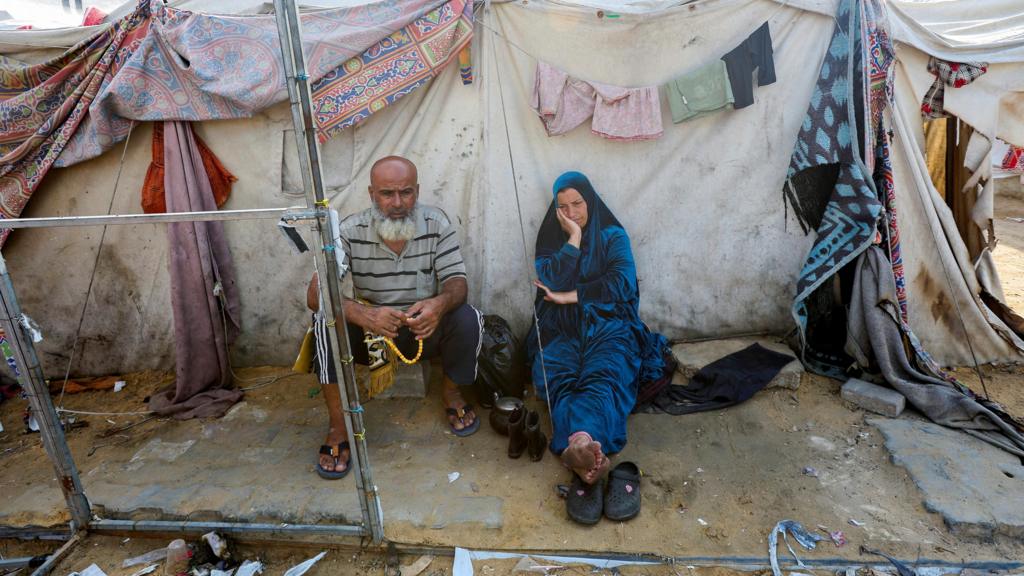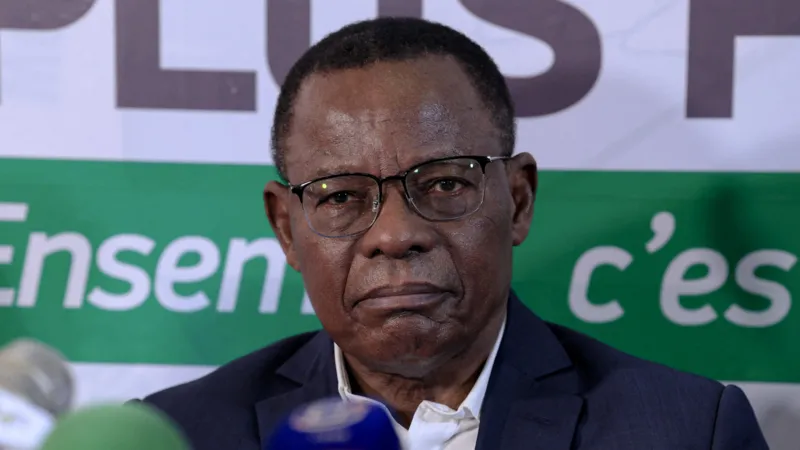US says it's watching Israeli actions in Gaza to ensure no 'starvation policy'
The US says it is monitoring Israel's actions in northern Gaza to ensure it's not pursuing "a policy of starvation"

IDF says Hezbollah battalion commander killed in Lebanon
The Israeli military says it has “struck and eliminated” a Hezbollah battalion commander, Hussein Muhammad Awada, in southern Lebanon.
The Israel Defense Forces also say they have “eliminated more than 45 terrorists".
Operations are continuing in Gaza, they say, with troops on the ground throughout the region.
'Too many people' will die during 30-day window to improve aid access, EU chief says
The EU's foreign policy chief has appeared to criticise the one-month timeframe the US has given Israel to improve aid access in Gaza, saying "too many people" will die in the region in that time.
As we've been reporting, the US sent a letter on Sunday telling Israel it had 30 days to boost aid access in Gaza, or it would risk losing some US military assistance.
Speaking to reporters earlier ahead of an EU leaders' summit in Brussels, Josep Borrell said: "The US has been saying to Israel that they have to improve humanitarian support to Gaza, but they gave one month delay."
"One month delay at the current pace of people being killed. It's too many people," he added.
US threat to cut Israel military aid is sign of anger at broken promises
The first aid in two weeks has gone into northern Gaza following a letter from the US that gave Israel 30 days to boost humanitarian access, or risk having some military assistance cut off.
The letter is the Biden administration’s most detailed public criticism yet of the way Israel has blocked humanitarian aid to Gaza. It was signed by Secretary of State Antony Blinken and Defence Secretary Lloyd Austin and was supposed to be private, until it was leaked to Israeli journalists., external
It is a blueprint for an entirely different approach by Israel to the aid operation in Gaza - expediting it, rather than imposing restrictions. The letter is a line-by-line examination of Israel’s obstruction of aid deliveries – and the way its forcible relocation of civilians has exposed 1.7 million Palestinians to serious risk of disease.
It even challenges Israel’s long-standing attack on Unrwa, the UN agency that looks after Palestinian refugees.
The US is “very concerned” about proposed new laws that would “remove certain privileges and immunities”. An Israeli government minister wants to confiscate Unrwa's headquarters in occupied East Jerusalem to use the land for a Jewish settlement.
The US says it acknowledges Israeli concerns about Unrwa, but that restrictions on it would “devastate” the humanitarian effort in Gaza and the education and welfare of tens of thousands of Palestinians in East Jerusalem and the occupied West Bank.
US says it's watching Israel to ensure it isn't pursuing 'policy of starvation' in Gaza
Senior US officials have reiterated their demand for Israel to increase the amount of aid entering the Gaza Strip, following on from a letter warning that American weapons funding could be affected if there were not improvements.
Over the past three days, aid has been able to reach northern Gaza after a two week stretch in which the UN says none was delivered there.
The US Defence Secretary Lloyd Austin was a co-signatory of the sharply-worded letter calling on Israel to make specific steps to address the dire humanitarian situation in Gaza.
The Pentagon - like the State Department - has acknowledged improvements in aid deliveries this week - but is continuing to reinforce the message.
Aid was again discussed in an overnight call between Austin and the Israeli defence minister.
Earlier, the US ambassador to the UN told the Security Council that Washington was watching to make sure that Israel’s actions on the ground did not amount to what she called “a policy of starvation.”
Israel denies there’s been a plan to block food entering northern Gaza where it began a new ground offensive two weeks ago against what it says are regrouping Hamas fighters.
Jabalia, in the north, remains encircled by Israeli troops with residents saying they’ve run out of food.
Israeli airstrike reported in east Lebanon village
In our last post, we shared details of a fresh Israeli evacuation order for two villages in eastern Lebanon.
Lebanon's state-run National News Agency is now reporting a strike in one of the villages, Tamnin al-Fawqa, about an hour after the warning telling residents to evacuate from a building was posted
We'll bring you more on this when we have it.
Israel issues new evacuation order for two east Lebanon villages
The Israeli military has issued an evacuation warning to residents in two villages in Lebanon's eastern Bekaa region.
One warning, posted on X by the IDF's Arabic language spokesman, Avichay Adraee, tells people to move at least 500m away from a building in the village of Sareen al-Tahta.
Adraee says people in the area are located near "Hezbollah facilities" that the IDF will "operate" against in the near future.
The second warning, also issued in the past hour, applies to Tamnin al-Fawqa, in which similar orders are repeated.
Warnings like these, which Israel issues regularly, usually precede Israeli airstrikes. Today's comes after reports of heavy strikes on Lebanon's eastern borders overnight.
Iran says it will strike Israel again 'painfully' if attacked
The commander-in-chief of Iran’s Islamic Revolution Guard Corps (IRGC), Maj-Gen Hossein Salami, says it will strike Israel "painfully" if it attacks Iranian targets.
"If you make a mistake and attack our targets, whether in the region or in Iran, we will strike you again painfully," Salami says at the funeral of an IRGC general killed in an Israeli strike in Lebanon last month, which also killed Hezbollah chief Hassan Nasrallah.
His comments come after Israel earlier this week said it will listen to the US, but any decision on how it responds to Iran's attack earlier this month will be based on its "national security needs".
Iran launched almost 200 ballistic missiles towards Israel on 1 October. Most of the projectiles were intercepted and, at the time, Israeli Prime Minister Benjamin Netanyahu said Iran had made a "big mistake" and would "pay for it".
Israel hits Syria with two wounded, state media says
Syrian state-run media has reported an overnight Israeli strike on the coastal city of Latakia. It says the strike injured two civilians and caused "material damage" to properties in near the city's south-eastern entrance.
The UK-based Syrian Observatory for Human Rights says the Israeli raid targeted a weapons depot in the city.
The Israeli military has not yet commented on the strikes, which come one week after Syrian media reported Israeli attacks on a car factory and military position in the central Homs and Hama regions.
US hits Houthi weapons sites in Yemen
The US has launched what it calls "precision strikes" on five weapons storage facilities in parts of Yemen controlled by the Iranian-backed Houthi group, with no reported civilian causalities.
In a statement overnight, US Defense Secretary Lloyd Austin says US forces targeted several "underground facilities" housing weapons used by the Houthis to target "civilian and military vessels" in the region.
Since last November, the Houthis have launched attacks on around 100 ships in the Red Sea and Gulf of Aden, sinking two vessels, which the group says are retaliation for Israel's military campaign in Gaza.
Overnight, Houthi-run Al Masirah TV reported that the capital city of Sanaa and the city of Saada had been targeted by the strikes.
Anger in Lebanon after Israeli strike killed mayor and 15 others
Lebanon’s caretaker Prime Minister Najib Mikati has issued a strong statement after an Israeli attack on a government building in Nabatieh yesterday, saying Israel had "deliberately targeted" a meeting by local authorities, while criticising the international community for its "silence" about Israel’s attacks on his country.
The attack in Nabatieh, one of the largest cities in the south of the country, killed 16 people, including the city’s mayor, Ahmed Kahil. According to Mikati, the airstrike happened as they were discussing the city’s "service and relief situation".
It was the first time a Lebanese government building was hit - and destroyed - by the Israeli military in this conflict.
"This new aggression, coupled with all the crimes committed by the Israeli enemy against civilians, is a mark of a world that is deliberately silent about the crimes of the occupation, which encourages it to persist in its aggression and crimes," Mikati said.
"What solution can be hoped for in light of this reality?"
The main headline in Lebanon's Al Nahar newspaper is "Devastation and massacre", while Al Diar newspaper says "Israel’s scorched-earth tactics".
The French-language newspaper L’Orient-Le Jour says "Israel blows up southern Lebanon".
The Israeli military said it had targeted infrastructure used by Hezbollah in Nabatieh and surrounding areas, describing the sites hit as "command centres" and “weapons storage facilities".
It accuses Hezbollah of embedding its infrastructure in civilian areas. But the military has not commented specifically about the attack on the municipal building, and why a functioning government facility was considered a legitimate target.
Dozens of civilians have been killed as Israel carries out widespread airstrikes across Lebanon. They include emergency responders, medical teams, and displaced residents. In several occasions, the Israeli military has not explained what or who was targeting.
-BBC







